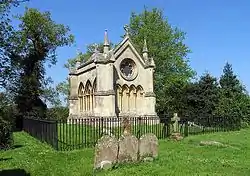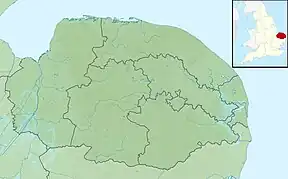Trafford Mausoleum, Wroxham
The Trafford Mausoleum, is a memorial in Wroxham, Norfolk, England. Commissioned after the death of Sigismund Trafford Southwell in 1827, the mausoleum was designed by Anthony Salvin in Gothic Revival style. It is a Grade II listed structure.
| Trafford Mausoleum | |
|---|---|
 | |
| Type | Mausoleum |
| Location | Wroxham, Norfolk |
| Coordinates | 52.7069°N 1.3978°E |
| Built | C.1830 |
| Architect | Anthony Salvin |
| Architectural style(s) | Gothic Revival (Early English style) |
Listed Building – Grade II | |
| Official name | Trafford Mausoleum, St Mary's Churchyard |
| Designated | 16 May 1984 |
| Reference no. | 1050869 |
 Location of Trafford Mausoleum in Norfolk | |
History and architecture
The building has been used to bury members of the Trafford family.[1] The Traffords of Wroxham Hall (now demolished) held land in the area from the Middle Ages.[2]
Sigismund Trafford Southwell, High Sheriff of Norfolk in 1818, died in 1827. His wife Margaret approached Anthony Salvin to design a mausoleum which was constructed c.1830.[3] It was built in the churchyard of St Mary the Virgin, Wroxham.[4] Salvin exhibited the design at the Royal Academy in 1830.[4] The style is Early English Gothic,[4] described in the Norfolk 1: Norwich and the North-East volume of Pevsner as a; "correct, rather cold later 13th century style".[5] The mausoleum is a Grade II listed structure.[4]
Notes
- "Wroxham Church opens Trafford Mausoleum". www.networknorwich.co.uk. Network Norwich. Retrieved 22 March 2019.
- "The Trafford Collection". discovery.nationalarchives.gov.uk. The National Archives. Retrieved 20 March 2022.
- "Trafford Mausoleum". www.mmtrust.org.uk. Mausolea & Monuments Trust. Retrieved 20 March 2022.
- Historic England. "Trafford Mausoleum, St Mary's Churchyard, Wroxham (Grade II) (1050869)". National Heritage List for England. Retrieved 20 March 2022.
- Pevsner & Wilson 2002, p. 738.
References
- Pevsner, Nikolaus; Wilson, Bill (2002). Norfolk 1: Norwich and North-East. The Buildings Of England. New Haven and London: Yale University Press. ISBN 0-300-09607-0.